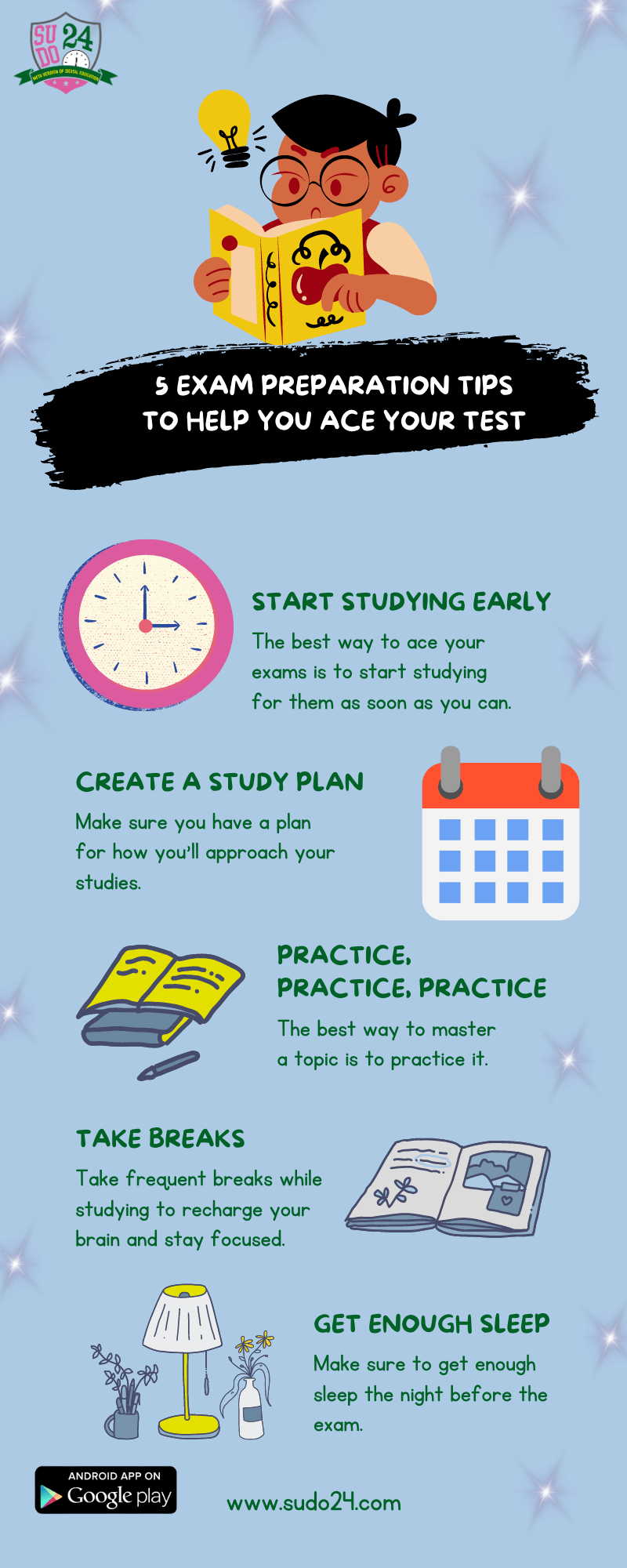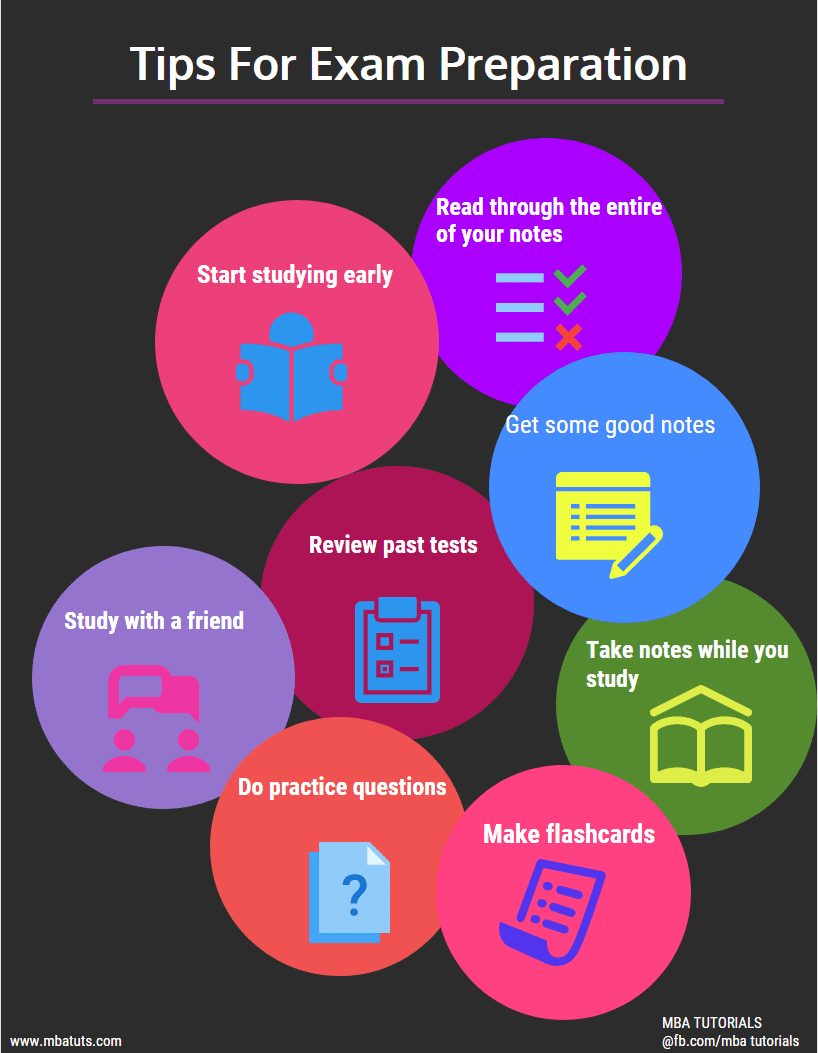Exam Preparation Tips: Master Your Studies with These Effective Strategies
Preparing for exams can be a stressful experience, but with the right strategies, you can face your exams with confidence and clarity. In this article, we’ll cover proven exam preparation tips that will help you manage your time, boost your retention, and ultimately achieve your best performance. Whether you’re preparing for a final exam, standardized test, or any other important assessment, these tips will ensure you’re ready for success.

1. Start Early and Plan Ahead
The key to successful exam preparation is starting early. Procrastination can lead to cramming, which increases anxiety and reduces retention. Instead, give yourself enough time to review all the material and reinforce your learning over several weeks.
How to Plan Your Study Schedule
-
Create a study calendar: Mark important exam dates on a calendar and work backward to create a study schedule. This will help you break down the material into manageable chunks.
-
Set realistic goals: Aim to cover specific topics each day, rather than cramming large volumes of information all at once. Make sure to include time for revision and practice tests.
By starting early, you allow yourself the opportunity to fully absorb the material and feel confident when the exam day arrives.
2. Organize Your Study Materials
An organized study routine is essential for efficient exam preparation. Ensure that your study materials are easily accessible and well-organized to reduce distractions and wasted time.
Tips for Organizing Your Study Materials
-
Group similar subjects: Keep notes, textbooks, and resources for each subject in separate folders or binders. This makes it easier to locate and review specific information when needed.
-
Use digital tools: If you prefer digital study materials, apps like Google Drive, Notion, or OneNote can help you store and organize notes, presentations, and practice tests.
Having everything organized means you can study more effectively and avoid wasting precious time searching for resources.

3. Use Active Learning Techniques
Passive reading and highlighting can only take you so far in your exam preparation. Active learning techniques are far more effective in helping you understand and retain information for the long term.
Active Learning Techniques to Try
-
Practice retrieval: Instead of rereading your notes, quiz yourself on the material. Write down everything you remember, and then check for accuracy.
-
Teach someone else: Explaining concepts to a friend or family member helps reinforce your understanding.
-
Use spaced repetition: Review information at increasing intervals to enhance long-term retention. Tools like Anki can help you implement this technique.
Active learning encourages deeper engagement with the material, making it easier to remember when it’s time for the exam.
4. Practice with Past Papers and Mock Exams
One of the best ways to prepare for exams is to practice with past papers or mock exams. Familiarizing yourself with the exam format helps reduce anxiety and gives you insight into what types of questions to expect.
How to Effectively Use Past Papers
-
Time yourself: Practice answering questions within the exam’s time constraints to improve your speed and efficiency.
-
Review mistakes: After completing a past paper or mock exam, review the answers and understand why you got certain questions wrong. This helps you avoid repeating the same mistakes.
Mock exams give you the confidence to face the real exam, knowing you have already practiced under exam conditions.

5. Take Regular Breaks to Stay Fresh
Studying for hours without a break can lead to burnout and reduced productivity. Taking regular breaks ensures that your brain stays fresh and helps you maintain focus over long study sessions.
How to Implement Breaks Effectively
-
Use the Pomodoro technique: Study for 25 minutes, followed by a 5-minute break. After four study sessions, take a longer break of 15-30 minutes.
-
Move around: Use breaks to stretch or take a walk. Physical movement helps refresh your mind and boosts concentration when you return to studying.
Breaks are essential for maintaining high levels of energy and focus throughout your study sessions.
6. Stay Healthy: Sleep, Diet, and Hydration Matter
Physical well-being plays a significant role in mental performance. Taking care of your body during exam preparation ensures that you have the energy and focus required to perform at your best.
How to Stay Healthy While Studying
-
Get enough sleep: Aim for 7-9 hours of sleep each night. A rested brain is better at retaining and recalling information.
-
Eat nutritious meals: Eat foods that fuel your brain, such as whole grains, fruits, vegetables, and lean proteins.
-
Stay hydrated: Dehydration can affect concentration and cognitive function, so drink plenty of water throughout the day.
Maintaining your health not only helps you study more effectively but also boosts your performance during exams.

7. Stay Positive and Manage Stress
Exam preparation can be stressful, but managing stress effectively is key to staying motivated and focused. A positive mindset can greatly impact how well you handle exam-related challenges.
Tips for Managing Stress
-
Practice relaxation techniques: Meditation, deep breathing, or yoga can help reduce stress and improve focus.
-
Visualize success: Picture yourself succeeding in the exam, which can build confidence and reduce feelings of anxiety.
-
Stay organized: A clear study schedule reduces stress by providing structure and reducing last-minute panic.
By managing stress and maintaining a positive attitude, you can approach exams with greater calmness and clarity.
8. Stay Consistent and Track Your Progress
Consistency is crucial for exam preparation. Studying regularly and tracking your progress helps you stay on course and ensures that you cover all necessary material before exam day.
How to Stay Consistent
-
Create a study routine: Stick to a set routine to make studying a habit. Consistency leads to better retention and less cramming.
-
Track your progress: Keep a record of what you’ve studied and what’s left to cover. Check off topics as you complete them to stay motivated.
Consistency not only helps with time management but also ensures that you don’t miss any important topics.
FAQs About Exam Preparation
1. How early should I start studying for exams?
It’s ideal to start at least 3-4 weeks before the exam, giving you enough time to review and practice all topics. However, starting even earlier gives you more flexibility and reduces stress.
2. How can I avoid burnout while studying?
Take regular breaks, get enough sleep, and engage in physical activity to keep your mind and body fresh. Also, remember to practice relaxation techniques to manage stress.
3. How can I stay focused while studying for long hours?
Use the Pomodoro technique, break your study sessions into manageable chunks, and eliminate distractions to maintain focus over long periods.
4. What should I do if I don’t understand a topic?
Seek help from a teacher, tutor, or study group. You can also use online resources like videos or forums to gain a better understanding.
5. Is it better to study alone or in a group?
It depends on your learning style. If you’re easily distracted, studying alone might be better. However, study groups can help clarify difficult topics and keep you motivated.
Conclusion
Effective exam preparation requires a combination of time management, active learning techniques, and self-care practices. By starting early, organizing your materials, practicing with past exams, and maintaining a healthy study routine, you’ll be well on your way to success. Remember to stay positive, manage stress, and keep track of your progress to ensure that you’re always moving forward. With these tips, you can approach your exams confidently and achieve your academic goals.








